I cannot review Psycho Patrol R in any way that matters. I could approach this mech-piloting, bullet-hungry immersive policing sim like any other first-person shooter with RPG elements, and tell you about its levels, storytelling, and gamey features. Or I could evaluate it on its own terms, as a piece of hallucinogenic hypercapitalist critique wrapped in a kevlar jacket of impenetrable irony whose own €39 price tag appears to be part of the joke. Neither approach is going to work. Psycho Patrol R requires a buy-in of brain rot and an almost memetic openness to mania. You’ll need to play it to better misunderstand it.
An elevator pitch: what if a Mechwarrior game was sponsored by the European Union, but then the developer went into a fugue state and made an immersive sim about snorting cocaine and exploding civilians into giblets? As elevator pitches go, you may currently be scared into the corner, waiting for your floor to ding. To be clear, developer Consumer Softproducts has not actually been sponsored by the EU. That would cause a diplomatic incident. But the militant police force you work for in-game is a hideous caricature of the organisation. The dark blue and golden stars of its flag appear everywhere in the state of Pan-Europa, and your unit, the European Federal Police, has work (murder) to do.
Some of that work takes place in the pilot seat of your mech. Some of it happens on-foot, with an off-brand AK-47 teetering at the end of your arm. Because of the frailty of your character, you’ll likely end up driving your mech around like it’s a big bulletproof car with legs. Small arms fire from regular soldiers can’t hurt you like this. You can put the sirens on and scare civilians who walk in random paths through the streets. Or you can simply stomp them to bits for cash. You are the police. There are no consequences for killing innocents.
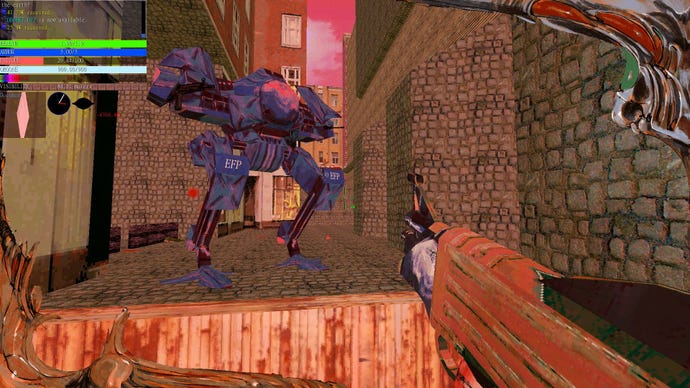
The world is a geometrically primitive warren of streets and hubs, slathered in slapdash textures and separated by quick loading screens and huge doorways marked by glowing holograms with “EXIT” scrolling across them. Take one route to cross a bridge full of shipping containers and be blown to pieces in a fraction of a second. Take another route to enter a town district patrolled by mechs and foot soldiers on high platforms, where you will last entire integers of time. 1 second, 2 seconds. maybe even 10 seconds. Perhaps this, then, is the way to go. This method of finding the path of least resistance is representative of how I approached the game as a whole. But it’s worth reiterating that (like the maker’s previous game Cruelty Squad) the phrase “least resistant” is one of gut-spilling relativity.
In other words, you will perish many times before you figure out a good attack pattern to rid the streets of threats before they strip away your mech’s armour and health. For a player like me, this results in a cautious game of gingerly poking around corners, and dashing back into cover whenever threatened. For fiercer minds, death’s embrace might spur a who-dares-wins speedrunniness. Dying does have harsh consequences, in that you’ll drop all your cash and only get one Soulsian chance to recover it. But there are workarounds, and you always reappear at the nearest checkpoint with pacey determination. Fighting fast and thoughtlessly certainly suits the theme of coked-up cops much better than Rainbow Six timidness. Yet I remain afraid of death.
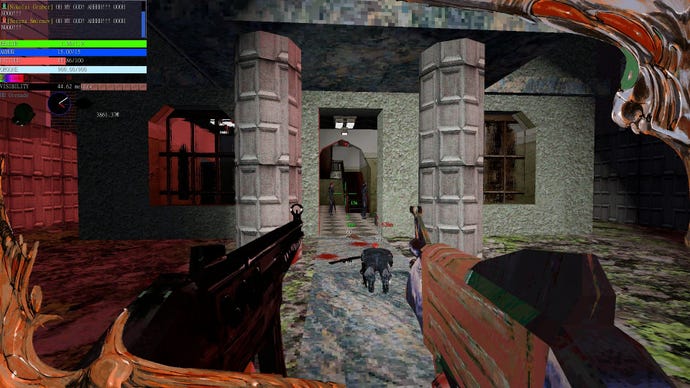
Outside your mech, a sharp burst of bullets from one stray soldier can kill you in an instant. You can activate “very easy” mode in the settings if you like, but I’m not sure what it changes. You still pop like a balloon full of blood. In the stompy V-Stalker you’re slightly more sturdy but you’ll still get shredded in about two eye blinks by any enemy mechajerk. Upgrades will make you more hardy, but later enemies will threaten you anew with higher calibre weapons and beefier armour of their own.
That last sentence could describe any video game. Please, do not be misled. If an immersive sim lives and dies on the strength of its verbs, then Psycho Patrol R, even in its larval early access form, is an aggressively robust carnival of capabilities. You can kick down doors and hack keypads, of course. But the game’s slant attitude extends even to the design tenets of an entire genre. You don’t just buy a cola from the vending machine, you buy a bottle of Cabernet Sauvignon. You don’t flush the toilets, you pick them up and throw them around. Reading governmental documents increases your toxicity by 1. You can press O at any time to summon an apparition of the State, a grinning spherical mascot of Pantone Reflex Blue surrounded by swirling stars who will give you “helpful” “hints”. You can bribe nearly anyone you meet.
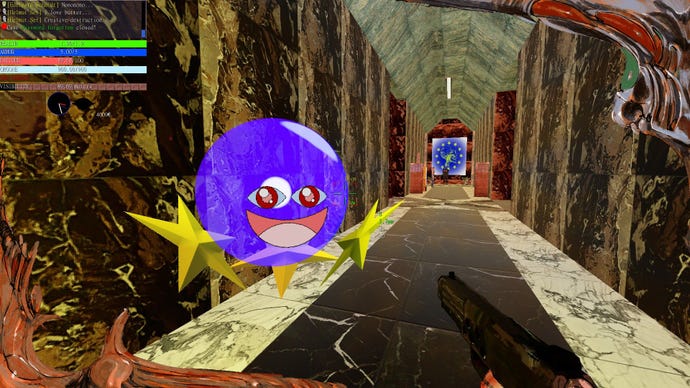
You can also invest all the blood money you earn into stocks – a familiar process to the organ brokers of Cruelty Squad. I accidentally invested my entire bank account in a strange food company. I thought I was spending 100 euro, but actually I was buying 100 stocks. You have a daily limit of financial transactions, which meant all my money was locked into a single company I did not research one bit. How do I tell my wife about this? Do I have a wife? Are wives permitted in Pan-Europa? It is not clear.
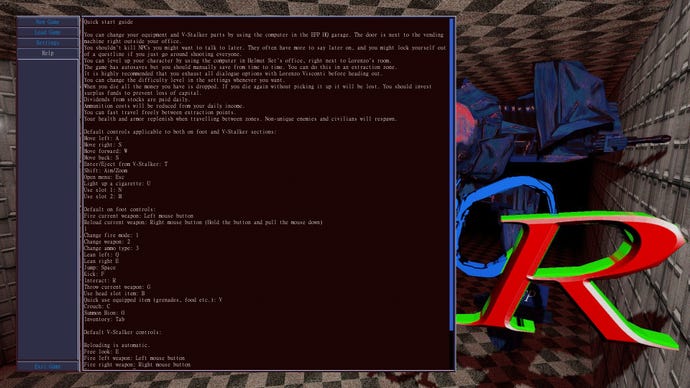
It is a satire of video games as much as it is a satire of fucked up governmental institutions and corporate malfeasance. In one early quest I had to calm an angry man in the government lobby who had a complaint about passport processing times. I tried to give him 10 euros to go away. “Keep your change, peasant,” he spat. Even after trying to calmly explain to the man that his anger was the result of a “psychohazard” and not, say, a corrupt bureaucracy, he refused to listen. He became furious and began to shoot at me about his passport. I ran into the offices, lost sight of the perp, then used the game’s “Track individual” option to highlight his whereabouts through the walls. I waited at the top of some stairs, watching a door, as his highlighted name stormed through the offices toward the entrance. BLAM. His head exploded. Passport processed.
I reported all this to my immediate superior – a manager with no eyes called Lorenzo – who reprimanded me for failing to perform a “psychonegotiation” with adequate skill. “Get out of my office,” he said, referring to the room with one thousand books textured fakely to the walls. The protagonist reveals in a note that they are in love with this manager. The password on your work computer is his whole name: LORENZOVISCONTI. It is case sensitive.
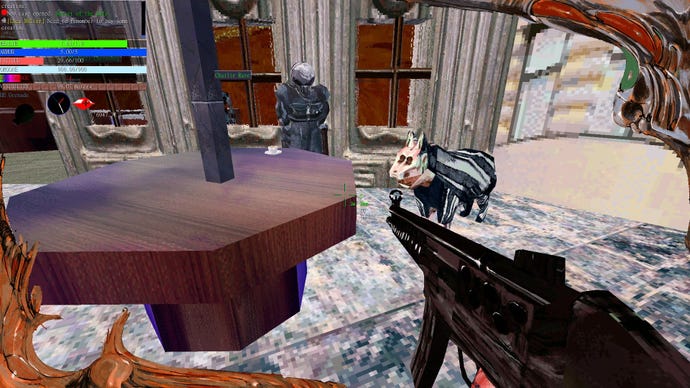
All this is to highlight the true appeal of Consumer Softproduct’s games. They aren’t swish, professionally polished products of an industry. They are scrappy murder pictures of comic disgust. The world of Psycho Patrol R is full of unsettling quest givers and chatty NPCs with no filter. There are military contractors with orbs for heads, start-up bros with big plans for potato logistics, bureaucrats with a severe cocaine addiction. Their dialogue is overpoweringly verbose, stupid, and sublime. It is basically what would happen if thecatamites was made creative director of the next Deus Ex.
Shortly after shooting a would-be assassin in the street, I spoke to a nearby woman in a suit. I could tell she had something to say because she stood still, unlike the dozens of other wandering NPCs you will run over for pocket money. The company woman went off on a rant about how each instance of human, animal, and plant life has a numerical value. A CEO’s dog is more important than the average human by these calculations, she said. “I can tell your value is about 0.4,” she told me. “Which is fine. Don’t worry about it.”
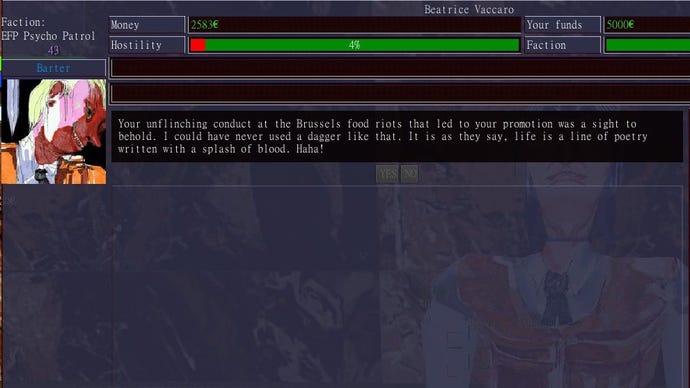
In her case, she had no quest for me, and could be freely murdered. But others are more significant. The game’s Steam page boasts (accurately) that “Every quest is a side quest”. And maybe more games could afford to embrace this philosophy. These quests involve important europolice duties, such as getting a businessman’s noisy neighbours to turn the music down, or finding a hedge fund manager’s lost pet. It sounds plain on paper, until you hear the “music” involved, or learn that the pet in question is a “humandog” called “Faceripper” who has been badly mistreated.
When I discovered this about the poor dog I confronted the hedge fund guy – a crass man called Vladimir. He shouted at me about how the dog needs discipline, and told me to fuck off. In my log, the protagonist’s feelings were noted: “He was very hostile to me, for some reason. I don’t respect people who don’t respect me. I need to meditate on this.”
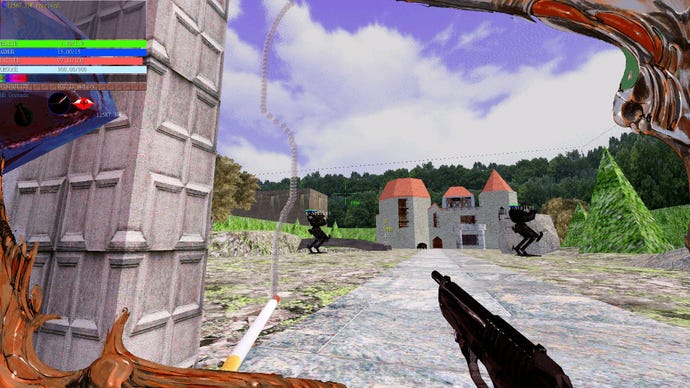
I meditate by shooting Vladimir in the head and taking the 50,000 euros he has in liquid cash. I use the money to buy a new core for my mech, some beefy steel legs, more body armour for my fragile human bod, and a hacking tool, which allows me to perform a torturously opaque hacking minigame. The night vision goggles I likewise purchase cast the world into a horrible blown-out green, even if it’s totally dark. I equip them only in the sewers, where I am eaten to death by “flesh rats” because I cannot aim my rifle straight from fatigue. I have not taken enough cocaine, or I have taken too much cocaine. I am not sure.
By now you either understand why this game is enticing, or you have abandoned any desire to play it. Perhaps both. You know a game is not an ordinary shooter when it generates Steam discussion topics such as: “how to become an accredited investor” or “can you change the computer wallpaper?” (By default your computer pause menu shows an image of William Blake’s Nebuchadnezzar – I see no reason to change it).
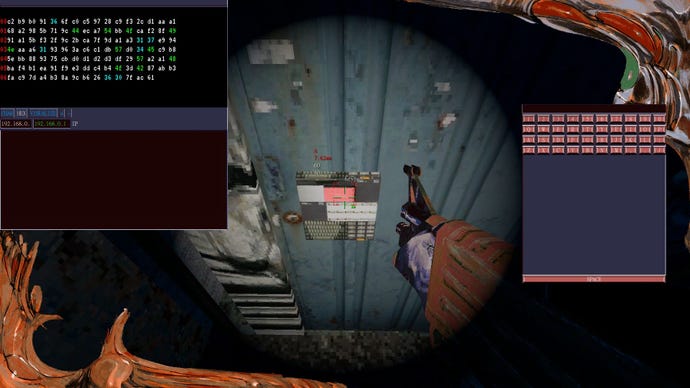
There is, to the abhorrence of some onlookers, a deep hunger for this kind of rampant simulation of militarism and madness. Whether that hunger is sated with this early access version, I don’t know. I still haven’t gotten past the “Apartment Wars” quest which sees you choose between corpo pondlife or raver dirtbags. I cannot discount the endless empty rooms with hideously clashing textures, but it is also difficult, given the nature of a Consumer Softproducts blaster, to tell what is an unfinished area, and what is just meant to look unfinished. I won’t discuss the surprising price tag any further, other than to say I recently spent the same amount of cash on a wrench, and I can say with solemn certainty that the bright moving images about getting my head shot off are more interesting.
So there it is, roughly 2000 words that may or may not fail to evaluate Psycho Patrol R in any manner befitting the term “review”. It is more interesting than a wrench. Hopefully you know some things you didn’t previously know, and I can call my job done. If you have learned nothing, please say so in the comments. It is important to me that we misunderstand art together.
This review was based on a free review copy supplied by the developer.











Add comment